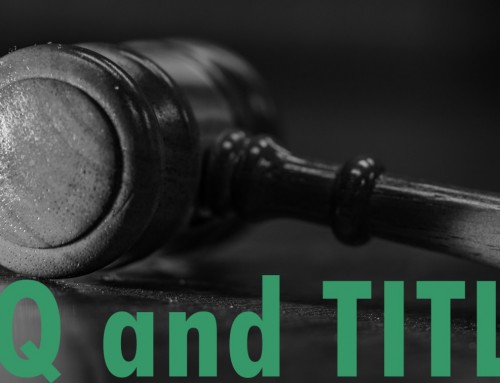As discussed in last month’s blog, Texas cities, school districts, and other governmental entities enjoy immunity from suit and liability in state court. However, the Texas Tort Claims Act waives this immunity in certain circumstances. Tex. Civ. Prac. & Rem. Code §101.001, et. seq. Individual employees, however, do not enjoy the same degree of protection. This article outlines the protections afforded to individual government employees, and the circumstances under which an employee can be held personally liable for her or his actions at work.
Private sector employees are generally personally liable for their negligent actions undertaken on the job. For example, a pizza delivery driver who negligently injures a pedestrian while delivering a pizza could be held personally liable to the pedestrian for her injuries. Further, the company for which the driver works could be held liable to the pedestrian under the principal-agent theory of respondeat superior. However, Texas common law provides for individual immunity from liability (but not from suit) for government employees in the exercise of their official duties. This immunity is often called “qualified immunity” or “official immunity,” and is specifically not abrogated by the Texas Tort Claims Act. Tex. Civ. Prac. & Rem. Code §101.026.
Official immunity is available to government employees when they exercise their (1) discretionary duties in (2) good faith while (3) acting within the scope of their authority. Franka v. Velasquez, 332 S.W.3d 367 (Tex. 2011). The first prong of this test permits an employee to assert official immunity only where her actions are taken in the performance of a discretionary duty—that is, not a ministerial act. City of Lancaster v. Chambers, 883 S.W.2d 650 (Tex. 1994). A ministerial act—for which the employee does not enjoy immunity—is one in which “the law prescribes and defines the duties to be performed with such precision and certainty as to leave nothing to the exercise of discretion or judgment.” Rains v. Simpson, 50 Tex. 495, 501 (1878). Conversely, discretionary acts require thought and judgment of the individual official. This dichotomy seems counterintuitive: employees can be held liable when they commit acts that they had no choice but to commit, but generally cannot be held liable when they exercise discretion. But this contrast serves the public policy purpose of permitting officials to freely exercise their discretion without fear of personal liability for negligent or improper performance, while discouraging the government from mandating improper acts by public employees. See Galveston County Health Dist. v. Hanley, 2014 Tex. App. LEXIS 13002, *16 (Tex. App.—Houston
The second prong requires the court to determine whether the official’s act was done in good faith. To answer this question, courts inquire as to “whether a reasonably prudent official, under the same or similar circumstances, could have believed that his conduct was justified based on the information he possessed when the conduct occurred.” Ballantyne, 144 S.W.3d at 426. This test is not about whether the official’s actions were correct, but whether a reasonably prudent official could have thought the actions were justified given the circumstances. “When an officer exceeds the bounds of reasonableness, good faith cannot be shown, and the officer will not enjoy official immunity’s protection.” Telthorster v. Tennell, 92 S.W.3d 457, 465 (Tex. 2002).
The third part of the test requires that the official have acted within the scope of his or her authority. This prong ensures that a government officer can be held liable for his intentional torts that are unrelated to his job functions. For example, if a government employee commits assault against a person outside of work hours while at a social function not affiliated with the governmental entity, the employee is not immune from suit simply by virtue of the fact that his employer happens to be a subdivision of the state or a municipality. If, however, an employee acts within the scope of his authority at work in making a business decision on behalf of his employer, but happens to make the wrong decision, he is immune from liability. Whether an employee acts “‘within the scope of his employment depends on whether the general act from which injury arose was in furtherance of the employer’s business and for the accomplishment of the objective for which the employee was employed.’” Gonzales, 353 S.W.3d at 273-74 (quoting Chesshir v. Sharp, 19 S.W.3d 502, 504 (Tex. App—Amarillo 2000, no pet.)). “[A]n employee’s negligent performance of their duties does not prevent the [employee’s] acts from being within the scope of their duties.” Williams v. Chatman, 17 S.W.3d 694, 699 (Tex. App—Amarillo 1999, pet. for reh’g overruled).
While immunity does not bar claims alleging that a government officer acted ultra vires—that is, outside of his/her authority, the fact that a claimant purports to allege “ultra vires” or “unconstitutional” conduct by a state official does not alone mean that it has avoided sovereign immunity and invoked a trial court’s inherent jurisdiction. To assert a valid ultra vires claim, the plaintiff “must not complain of a government officer’s exercise of discretion, but rather must allege, and ultimately prove, that the officer acted without legal authority or failed to perform a purely ministerial act.”
Creedmoor-Maha Water Supply Corp. v. Tex. Comm’n on Envtl. Quality, 307 S.W.3d 505, 515 (Tex. App—Austin 2010, no pet.) (quoting El Paso v. Henrich, 284 S.W.3d 366, 372 (Tex. 2009)).
Echoing the three prong test discussed above, Texas law specifically provides immunity for educators in Chapter 22 of the Education Code as follows:
A professional employee of a school district is not personally liable for any act that is incident to or within the scope of the duties of the employee’s position of employment and that involves the exercise of judgment or discretion on the part of the employee, except in circumstances in which a professional employee uses excessive force in the discipline of students or negligence resulting in bodily injury to students.
Tex. Educ. Code § 22.0511(a). Thus, an educator can show immunity by conclusively proving as a matter of law all of the elements of Section 22.0511(a): (1) that he/she was a an employee of a school district; (2) that his/her actions were incident to or within the scope of his/her duties; and (3) that his/her duties involved the exercise of judgment or discretion on his/her part.” Gonzalez v. Grimm, 353 S.W.3d 270, 273 (Tex. App—El Paso 2011, no pet.).
Remember, official immunity does not shield an official from suit—only from liability. Thus, an employee should respond with a motion for summary judgment to challenge a suit in which he/she can meet the three prongs above to invoke immunity. But many of these lawsuits involve questions of fact, such as whether an employee acted in good faith, or whether the employee acted pursuant to official job duties. These questions of fact may preclude summary judgment.
Finally, Texas law limits a plaintiff’s avenues for suit by an election of remedies provision. Under §101.106 of the Texas Tort Claims Act, suit against a governmental unity “forever bars any suit or recovery by the plaintiff against any individual employee of the governmental unit regarding the same subject matter.” Thus, if a plaintiff sues the entity, the plaintiff has forfeited the opportunity to sue the individual official, except in that employee’s official (rather than individual) capacity.
While there are multiple barriers to recovery against an individual government employee, this does not stop plaintiffs from bringing suit against these individuals. As such, government officials should consider membership in a professional organization that provides legal representation in the event of suit.
Prepared by the offices of Richard Abernathy, this article should not be construed as legal advice related to any specific facts or circumstances. Although this article covers legal subjects, it is intended to educate readers and not to provide advice that will be the basis for action or inaction in any specific circumstance. Viewing these materials does not create an attorney-client relationship between Abernathy, Roeder, Boyd & Hullett, P.C. and the reader or the reader’s institution. For circumstance-specific legal advice, please directly contact a licensed attorney.







Leave A Comment